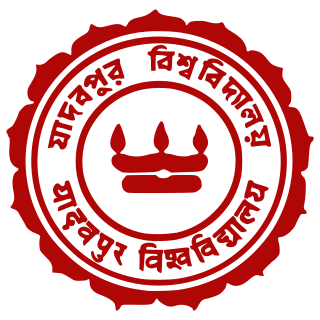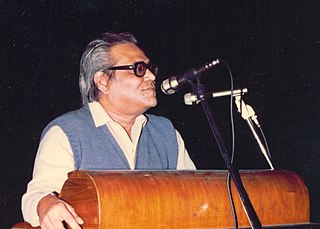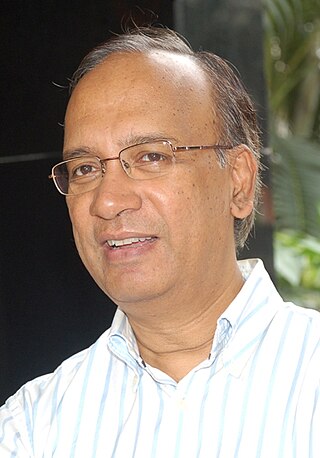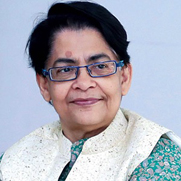
Jadavpur University is a public state funded research and technology university with its main campus located at Jadavpur, Kolkata, West Bengal, India. It was established in 1906 as Bengal Technical Institute and was converted into Jadavpur University in 1955. As of 2023 NIRF rankings, Jadavpur University has been ranked 4th among universities, 10th among engineering institutes, and 13th overall in India. The university has been recognized by UGC as an institute with Potential for Excellence.

Jadavpur is a southern neighbourhood of Kolkata in the district of Kolkata of West Bengal, India. Jadavpur is one of the important junctions in South Kolkata. Jadavpur University and a number of research institutes of national and international repute are located in Jadavpur.

The Council of Scientific and Industrial Research is a research and development (R&D) organisation in India to promote scientific, industrial and economic growth. Headquartered in New Delhi, it was established as an autonomous body in 1942 under the aegis of the Department of Scientific and Industrial Research (DSIR), Ministry of Science and Technology, Government of India. CSIR is among the largest publicly funded R&D organisations in the world. CSIR has pioneered sustained contribution to science and technology (S&T) human resource development in India.

Raghunath Anant Mashelkar,, also known as Ramesh Mashelkar, is an Indian Chemical Engineer, born in a village named Marcel in Goa and brought up in Maharashtra.
Education in West Bengal is provided by both the public sector as well as the private sector. The modern education system was developed by the British missionaries and the Indian social reformists. West Bengal has many institutes of higher education like –Indian Institute of Technology Kharagpur, Marine Engineering and Research Institute, Jadavpur University, Indian Institute of Management Calcutta, Indian Institute of Engineering Science and Technology, Shibpur, Indian Institute of Science Education and Research, Kolkata, National Institute of Technology, Durgapur, Indian Institute of Information Technology, Kalyani, Indian Statistical Institute, West Bengal University of Health Sciences, University of North Bengal and University of Calcutta.

The Centre for Cellular and Molecular Biology or CCMB is an Indian fundamental life science research establishment located in Hyderabad that operates under the aegis of the Council of Scientific and Industrial Research. CCMB is a designated "Centre of Excellence" by the Global Molecular and Cell Biology Network, UNESCO.

The CSIR-Indian Institute of Chemical Technology is a national-level research center located in Hyderabad, Telangana, India under the Council of Scientific and Industrial Research (CSIR). IICT conducts research in basic and applied chemistry, biochemistry, bioinformatics, chemical engineering and provides science and technology inputs to the industrial and economic development of the country. IICT has filed one of the maximum CSIR patents.

The Central Drug Research Institute is a multidisciplinary research laboratory in Lucknow, India, employing scientific personnel from various areas of biomedical sciences. Dr. Radha Rangarajan, An alumnus of Stanford University, University of Michigan, and Rockefeller University,She has been a postdoctoral fellow at Harvard School of Public Health, is the incumbent director of the Central Drug Research Institute.

Manchanahalli Rangaswamy Satyanarayana Rao was an Indian scientist. He was awarded the fourth-highest civilian award, the Padma Shri, for Science and Engineering in 2010. From 2003 to 2013 he was president of Jawaharlal Nehru Centre for Advanced Scientific Research (JNCASR) in Bangalore, India.
Pushpa Mittra Bhargava was an Indian scientist, writer, and administrator. He founded the Centre for Cellular and Molecular Biology, a federally funded research institute, in Hyderabad. He was outspoken and highly influential in the development of scientific temper in India, and argued that scientific rationalism needed to be cultivated as a civic duty.
The Indian Ordnance Factories Service (IOFS) is a civil service of the Government of India. IOFS officers are Gazetted defence-civilian officers under the Ministry of Defence. They are responsible for the administration of the Indian Ordnance Factories, which provide the indigenous defence production capabilities of India.
Souvik Maiti is an Indian chemist known for his studies in the fields of biophysical chemistry and chemical biology focusing on nucleic acids, DNA and RNA. He works at the Institute of Genomics and Integrative Biology. He is also visiting scientist at National Chemical Laboratory Pune.
Chitra Dutta is a former chief scientist and head of Structural Biology and Bioinformatics division in CSIR-Indian Institute of Chemical Biology, Kolkata, India. She is a physicist working in the areas of bioinformatics and computational biology. She is engaged in 'in-silico' analysis of genome/proteome architectures of host/vector/pathogen systems in quest of novel intervention strategies. Comparative genome analysis of various bacterial, viral and parasitic pathogens conducted by her group have not only given an insight into the natural forces driving the molecular evolution of the microbial world, but also provided a better understanding of the intricacies of pathogen–host interactions and co-evolution. She has demonstrated how the relative strengths of various selection pressures vary within and across the organisms depending on their G+C-content, life-style and taxonomic distribution. Her group has also delineated the role played by mutational imbalance, hydrophobicity, gene expressivity and aromaticity in shaping microbial protein architectures. She is also internationally acclaimed for her studies on ‘Chaos game representation’. She has developed novel algorithms for recognition of fractal patterns in nucleotide and amino acid sequences through statistical analyses of genome and proteome composition of different thermophilic, symbiotic/parasitic organisms and she has revealed that thermal adaptation involves overrepresentation of purine bases in mRNAs, higher GC-content of the structural RNAs and enhanced usage of positively charged residues and aromatic residues at the cost of neutral polar residues, while the parasitic adaptation is reflected in the extreme genome reduction, presence of weak translational selection and large heterogeneity in membrane associated proteins. Recent works from her group on 'pan-genomic analysis of human microbiome in health and diseases' have also been highly acknowledged in scientific literature.
Bimal Kumar Bachhawat was an Indian neurochemist and glycobiologist, known for his discovery of HMG-CoA lyase, an intermediate in the mevalonate and ketogenesis pathway, and for the elucidation of the molecular cause of metachromatic leukodystrophy, a hereditary disease of the brain His studies on sugar-bearing liposomes led to its use as a carrier for in situ delivery of drugs and hormones to diseased organs and he pioneered the therapy of systemic fungal infections using liposomal formulations. He was a recipient of several awards including the Shanti Swarup Bhatnagar Award, the highest Indian honor in science and technology and an elected fellow of three major Indian science academies. The Government of India awarded him the third highest civilian honour of the Padma Bhushan, in 1990, for his contributions to science.

Amar Nath Bhaduri was an Indian molecular enzymologist and chemical biologist, known for his studies on UDP-glucose 4-epimerase, a homodimeric epimerase found in cells and his work on Leishmania donovani, the protozoal pathogen for Kala-azar. He was the director of the Indian Institute of Chemical Biology (IICB), Kolkata and an elected fellow of the Indian National Science Academy and the Indian Academy of Sciences. The Council of Scientific and Industrial Research, the apex agency of the Government of India for scientific research, awarded him the Shanti Swarup Bhatnagar Prize for Science and Technology, one of the highest Indian science awards, in 1978, for his contributions to biological sciences.

Siddhartha Roy is an Indian structural biologist, biophysicist, former director of the Indian Institute of Chemical Biology and the former director (officiating) of Bose Institute. Widely known for his studies on bacteriophage lambda and protein synthesis, he is an elected fellow of the Indian Academy of Sciences and the Indian National Science Academy. In 1999, the Council of Scientific and Industrial Research, the apex agency of the Government of India for scientific research, awarded him the Shanti Swarup Bhatnagar Prize for Science and Technology, for his contributions to Biological sciences.
Suvendra Nath Bhattacharyya is an Indian molecular biologist, epigeneticist and the principal scientist at the Indian Institute of Chemical Biology of the Council of Scientific and Industrial Research. He is a recipient of the Swarnajayanthi Fellowship of the Department of Science and Technology and the National Bioscience Award of the Department of Biotechnology. The Council of Scientific and Industrial Research, the apex agency of the Government of India for scientific research, awarded him the Shanti Swarup Bhatnagar Prize for Science and Technology, one of the highest Indian science awards, in 2016, for his contributions to biological sciences.
Chitra Mandal is a chemical biologist in the field of biomolecules and their applications in health and diseases. Later she worked on cancer therapeutics. She served as the acting Director of CSIR - Indian Institute of Chemical biology in Kolkata, India. during 2014–2015.

Chandrima Shaha is an Indian biologist. As of September 2021, she is the J. C. Bose Chair Distinguished Professor at the Indian Institute of Chemical Biology, Kolkata. She is the former Director and former Professor of Eminence at the National Institute of Immunology. She was the President of Indian National Science Academy (2020–22) and the Vice President of the same academy (2016–2018). She is an elected fellow of the World Academy of Sciences, Indian National Science Academy, Indian Academy of Sciences, National Academy of Sciences and the West Bengal Academy of Science and Technology.

Dipyaman Ganguly is an Indian physician-scientist immunologist and cell biologist, currently a Principal Scientist and Swarnajayanthi Fellow at the CSIR-Indian Institute of Chemical Biology (IICB). He heads the Dendritic Cell Laboratory of IICB, popularly known as the Ganguly Lab, where he hosts several researchers involved in research on regulation of innate Immunity and pathogenesis of inflammatory disorders. The Council of Scientific and Industrial Research, the apex agency of the Government of India for scientific research, awarded him the Shanti Swarup Bhatnagar Prize for Science and Technology, one of the highest Indian science awards for his contributions to Medical Sciences in 2022.













